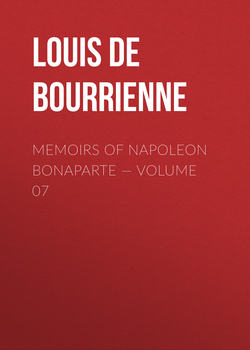Memoirs of Napoleon Bonaparte — Volume 07

Реклама. ООО «ЛитРес», ИНН: 7719571260.
Оглавление
Louis de Bourrienne. Memoirs of Napoleon Bonaparte — Volume 07
CHAPTER XIX
CHAPTER XX
CHAPTER XXI
CHAPTER XXII
CHAPTER XXIII
CHAPTER XXIV
CHAPTER XXV
CHAPTER XXYI
Отрывок из книги
In the month of April 1803 Prince Borghese, who was destined one day to become Bonaparte's brother-in-law by marrying the widow of Leclerc, was introduced to the First Consul by Cardinal Caprara.
About the end of June Bonaparte proceeded, with Josephine, on his journey to Belgium and the seaboard departments. Many curious circumstances were connected with this journey, of which I was informed by Duroc after the First Consul's return. Bonaparte left Paris on the 24th of June, and although it was not for upwards of a year afterwards that his brow was encircled with the imperial-diadem, everything connected with the journey had an imperial air. It was formerly the custom, when the Kings of France entered the ancient capital of Picardy, for the town of Amiens to offer them in homage some beautiful swans. Care was taken to revive this custom, which pleased Bonaparte greatly, because it was treating him like a King. The swans were accepted, and sent to Paris to be placed in the basin of the Tuileries, in order to show the Parisians the royal homage which the First Consul received when absent from the capital.
.....
Bonaparte wished to be the sole centre of a world which he believed he was called to govern. With this view he never relaxed in his constant endeavour to concentrate the whole powers of the State in the hands of its Chief. His conduct upon the subject of the revival of public instruction affords evidence of this fact. He wished to establish 6000 bursaries, to be paid by Government, and to be exclusively at his disposal, so that thus possessing the monopoly of education, he could have parcelled it out only to the children of those who were blindly devoted to him. This was what the First Consul called the revival of public instruction. During the period of my closest intimacy with him he often spoke to me on this subject, and listened patiently to my observations. I remember that one of his chief arguments was this: "What is it that distinguishes men? Education—is it not? Well, if the children of nobles be admitted into the academies, they will be as well educated as the children of the revolution, who compose the strength of my government. Ultimately they will enter into my regiments as officers, and will naturally come in competition with those whom they regard as the plunderers of their families. I do not wish that!"
My recollections have caused me to wander from the journey of the First Consul and Madame Bonaparte to the seabord departments and Belgium. I have, however, little to add to what I have already stated on the subject. I merely remember that Bonaparte's military suite, and Lauriston and Rapp in particular, when speaking to me about the journey, could not conceal some marks of discontent on account of the great respect which Bonaparte had shown the clergy, and particularly to M. de Roquelaure, the Archbishop of Malines (or Mechlin). That prelate, who was a shrewd man, and had the reputation of having been in his youth more addicted to the habits of the world than to those of the cloister, had become an ecclesiastical courtier. He went to Antwerp to pay his homage to the First Consul, upon whom he heaped the most extravagant praises. Afterwards, addressing Madame Bonaparte, he told her that she was united to the First Consul by the sacred bonds of a holy alliance. In this harangue, in which unction was singularly blended with gallantry, surely it was a departure from ecclesiastical propriety to speak of sacred bonds and holy alliance when every one knew that those bonds and that alliance existed only by a civil contract. Perhaps M. de Roquelaure merely had recourse to what casuists call a pious fraud in order to engage the married couple to do that which he congratulated them on having already done. Be this as it may, it is certain that this honeyed language gained M. de Roquelaure the Consul's favour, and in a short time after he was appointed to the second class of the Institute.
.....